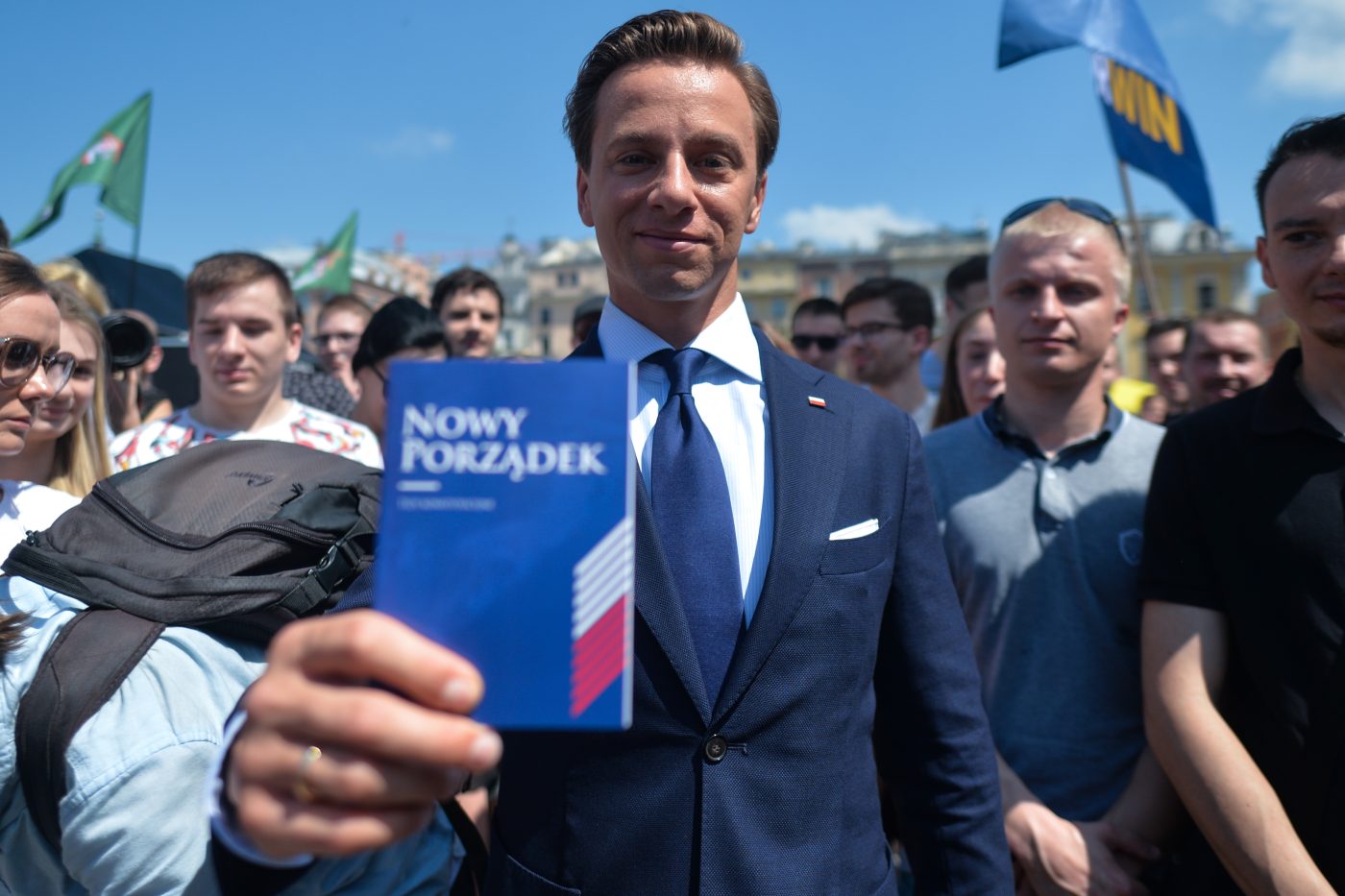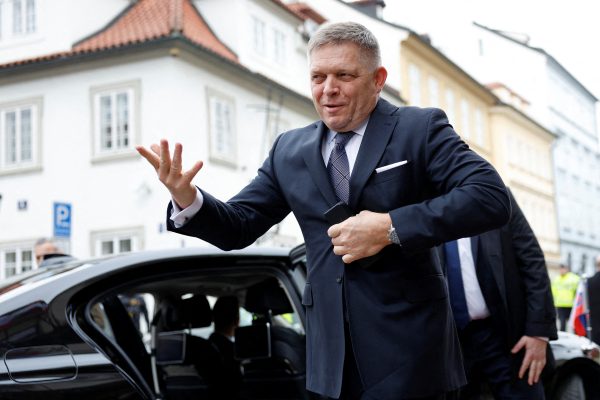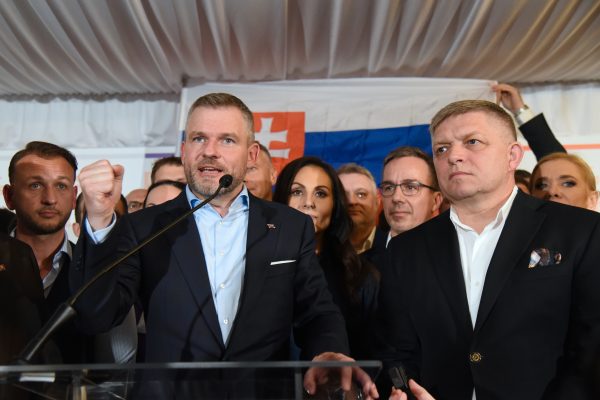Since the beginning of Russia’s all-out invasion of Ukraine, Poland has emerged as a bedrock of support for Ukraine and a key partner on NATO’s Eastern Flank and — as the analyst Chels Michta has noted — enjoys increasing strategic influence. Poland’s ruling Law and Justice party (PiS) has received much of the credit for its response, both at home and in the international community.
Yet over the past six months, support for Poland’s radical right-wing Konfederacja party has nearly doubled to around 10%, with the party now polling third for the first time since it was founded in 2019. Although the right has long been the dominant political force in Poland, the rise of Konfederacja marks a sharp departure from the norm.
It is questioning of bedrock policies like the country’s “unconditional support” for Ukraine, and even Poland’s transatlantic ties remain firmly a fringe position and conflict with the beliefs held by Polish society as a whole. But its support profile gives the lie to the notion that only the old support such parties — 20% of under-30s voted for Konfederacja in 2019.
Despite the largely successful government-led response to Russia, multiple crises are taking a toll on Poland, and putting pressure on its leadership. PiS is currently polling around 34%, well below what is required to form a majority government. Meanwhile, a soaring cost of living driven by high inflation, the influx of Ukrainian refugees, and fear that the war will escalate, are all being exploited by Konfederacja. Notable too, are widespread protests from farmers — one of PiS’ main sources of support — about competition for cheap Ukrainian grain. Poland’s agriculture minister resigned on April 5 after the European Union (EU) extended the tariff relaxation to 2024.
In its electoral manifesto, “On Poland’s Side,” geared toward this year’s October parliamentary elections, Konfederacja lays out a novel approach to Ukraine. In contrast to PiS policy, the program stipulates the need for Ukraine to “guarantee Polish companies participate in the reconstruction of Ukraine on preferential terms,” in exchange for aid. Likewise, they criticize the ruling party as “servants of the Ukrainian people” for accepting and caring for refugees at the expense of Polish society (around 1.6 million Ukrainian refugees have registered in Poland and costs in 2022 were around $9bn, although the EU refunded some of that.) At best, this may seem tone-deaf cynicism, but given Konfederacja’s history, this rhetoric betrays a more fundamental conflict with Ukraine and Western solidarity.
The party has long expressed anti-Ukrainian views, drawing largely on historical grievances, and these remain an integral part of its platform. MP Janusz Korwin-Mikke, 80, a central figure in Konfederacja and a Putin apologist, was recently reprimanded for “suggesting to the public that Ukrainian citizens, not Russian soldiers, may have been responsible for the massacre of the Bucha residents,” after he tweeted his own take on the mass killings by Russian troops. In a similar vein, Mikke implied that the US was at fault for the all-out invasion stating that “arming Ukraine provoked the Russian Federation.” He has previously referred to the inferiority of women and suggested rabbis may have provoked pogroms to improve Jewish genetic stock.
Predictably perhaps, the party also questions Poland’s transatlantic ties, which party representatives have cast in terms of “American imperialism.” Konfederacja MP Robert Winnicki, speaking to far-right media, accused the ruling Law and Justice party of “liquidating Poland’s sovereignty” through “vassalization to Washington.” Similarly, Konfederacja MP Grzegorz Braun described the US-Poland Enhanced Defense Cooperation Agreement of 2020, as “colonization-plus or maybe even occupation-plus” at a parliamentary press conference.
Since the all-out war, Konfederacja has taken steps to tone down its rhetoric, shifting attention to younger and less controversial party leaders such as its 2019 Presidential candidate Krzysztof Bosak, and chairman Sławomir Mentzen. (This may reflect a recognition of popular support for Ukraine against Russia, the old enemy — 77.5% support sending weaponry, though few back financial aid.) Yet Konfederacja’s surface-level rebranding does little to change the party’s underlying principles.
The radical right’s surge in the polls has more to do with PiS’s electoral shortcomings, and its need to bolster support than it does with Konfederacja itself. It is possible that Konfederacja will find itself in the position of kingmaker if PiS is unable to open a significant lead against the centrist Civic Coalition (KO), which currently polls around 25%. It would once have been unthinkable to imagine a coalition, formal or otherwise, between PiS and Konfederacja, but some on both sides have floated the idea. It might give the governing party a significant electoral boost in the Sejm but would pull Polish politics further to the right.
Debate has already shifted to discussing what compromises would be necessary for this possible coalition. While there are leading voices in each party that still flatly reject the possibility of cooperation, there are signs of change. MP Janusz Korwin-Mikke, for all his controversial bravado, suggested that “we can rule even with PiS,” in an interview in March.
From the side of PiS, the decision to join Konfedercja would be more complicated. The government is far from unified and would face resistance from its moderate wing, loosely headed by PM Mateusz Morawiecki. The EU, already at loggerheads with Poland over rule of law and other issues, would no doubt be appalled by the prospect of a more illiberal government, and the US will want continuing support for Ukraine from one of its most determined backers. NATO not only supplies Ukraine through the critically important Rzeszów air base, but Poland’s plans to double defense expenditure will make it one of the alliance’s biggest military powers.
However, the government’s right-wing camp, led by Justice Minister Zbigniew Ziobro, has already indicated a willingness to cooperate with Konfederacja. Deputy Minister Janusz Kowalski stated in March that “there are no enemies on the right,” and further that “Mentzen would be a good experiment as finance minister.”
There is still much to play for with elections five months away, so a lot can change. But these are happy days for Poland’s radical right.
Nathan Alan-Lee is a doctoral researcher at the School of Slavonic and East European Studies, University College London, and is a commentator on Polish and regional affairs.
Europe’s Edge is CEPA’s online journal covering critical topics on the foreign policy docket across Europe and North America. All opinions are those of the author and do not necessarily represent the position or views of the institutions they represent or the Center for European Policy Analysis.





